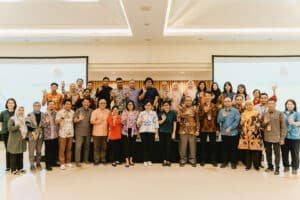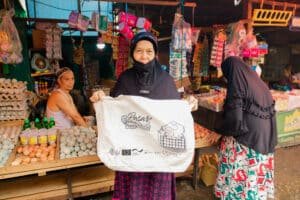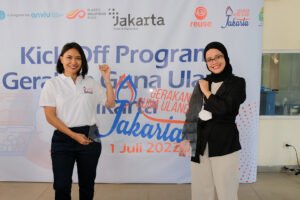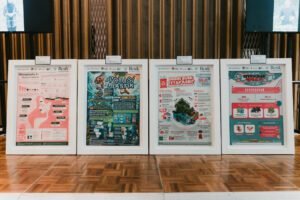Banjarmasin (25 November 2021). The Mayor of Banjarmasin, Ibnu Sina, together with the Banjarmasin City Environmental Service and the Indonesian Plastic Bag Diet Movement supported by the European Union and the German Government through the Rethinking Plastics: Circular Economy Solution to Marine Litter project have just launched a trial of the Plastic Free Market in the Kayuh Hall. Baimbai, Banjarmasin City. This Plastic Free Market Program is an effort to support PERWALI Banjarmasin City No. 18 of 2016 concerning Reducing the Use of Plastic Bags, which has not been regulated in traditional markets. As stated by the Mayor of Banjarmasin in his speech.
“During the pandemic, the waste problem in the City of Banjarmasin became one that was neglected and was not included in any program at PEMKO Banjarmasin, but Alhamdulillah, the Banjarmasin City LH Service, supported by the community, remains committed to implementing PERWALI No. 18 of 2016 concerning the Ban on Plastic Bags in modern retail and in minimarkets too. And we continue to collaborate with many parties, including traditional markets. “For this reason, we are now conducting a trial of the Plastic Free Market, which will be launched today,” said Ibnu Sina, Mayor of Banjarmasin.
Apart from that, the Plastic Free Market Program also aims to help the community’s economic growth and MSMEs in Banjarmasin City. “Why do we have a Plastic Free Market Program? The market is the heartbeat of the economy; from the time when civilization was still young, the first market emerged before there were supermarkets and minimarkets, the first market emerged. So, the market carries a culture of rich local wisdom that has emerged over the centuries. And people say, now the market has lost to modernity, lost to supermarkets, but not. Markets are irreplaceable because 70% of Indonesian people still shop at markets. The Indonesian Plastic Bag Diet movement has long supported limiting single-use plastic. Since 2016, he has supported and accompanied the city of Banjarmasin when Banjarmasin became the first city in Indonesia to ban plastic bags. I am also proud that Banjarmasin has inspired other cities and districts in Indonesia, where more than 60 cities have banned plastic bags. All because Banjarmasin inspired it. Therefore, this time, we want to make the Banjarmasin market a powerful market with character and free from single-use plastic. We hope that the Plastic Free Market in Banjarmasin can save traders’ expenses, as happened at West Tebet Market, where there was a 169% increase in consumers bringing reusable shopping bags after six months of implementation. “That means that traders’ spending on buying plastic bags has also decreased.” Explained Tiza Mafira, Executive Director of the Indonesian Plastic Bag Diet Movement.
This Plastic Free Market Trial will be carried out in Pandu Market and Pekauman Market, Banjarmasin, which will be implemented as of December 13, 2021. Various kinds of socialization and educational activities have been carried out in both markets, starting from research on plastic consumption and discussions with community leaders. Traders, signing commitments between parties, door-to-door plastic-free shopping guides for traders, and other forms of campaigns and outreach carried out online and face-to-face in the market area.
Based on research conducted by the Indonesian Plastic Bag Diet Movement, these two markets are very worrying. At the Pandu market, the number of purchases of large plastic bags from all traders reached 666 pcs/day, and the number of small plastic bags from all traders reached 1,740 pcs/day. Meanwhile, at Pekauman Market, the number of purchases of large plastic bags from all traders reached 6,465 pcs/day, and the number of small plastic bags from all traders earned 12,285 pcs/day.
With this Plastic Free Market Program, it is hoped that all traders and consumers at Pandu Market and Pekauman Market will begin to get used to no longer using single-use plastic when shopping and can create a single-use plastic-free Banjarmasin.








